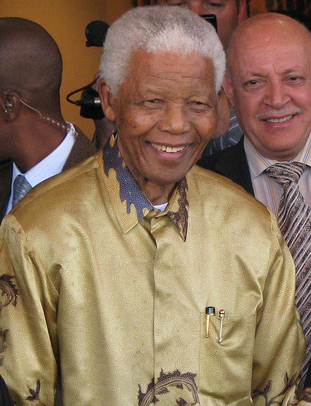Nelson Mandela on friendship, From his unplubished autobiographical manuscript written in 1975. Source: From Nelson Mandela By Himself: The Authorised Book of Quotations © 2010 by Nelson R. Mandela and The Nelson Mandela Foundation http://www.nelsonmandela.org/content/mini-site/selected-quotes
1970s
Nelson Mandela Quotes
1990s, Long Walk to Freedom (1995)
Nelson Mandela on humour, From an interview with Tim Couzens, Verne Harris and Mac Maharay for Mandela: The Authorized Portrait, 2006 (13 August 2005). Source: From Nelson Mandela By Himself: The Authorised Book of Quotations © 2010 by Nelson R. Mandela and The Nelson Mandela Foundation http://www.nelsonmandela.org/content/mini-site/selected-quotes
2000s
1960s, I am Prepared to Die (1964)
Suzanne Belling, "Mandela bears message of peace in first visit to Israel", http://www.jewishsf.com/content/2-0-/module/displaystory/story_id/12309/edition_id/237/format/html/displaystory.html jweekly.com, 22 October 1999
Attributed
1990s, Long Walk to Freedom (1995)
2000s, The Sacred Warrior (2000)
Suzanne Belling, "Mandela bears message of peace in first visit to Israel", http://www.jewishsf.com/content/2-0-/module/displaystory/story_id/12309/edition_id/237/format/html/displaystory.html jweekly.com, 22 October 1999
Attributed
Nelson Mandela on freedom of expression, At the international press institute congress (14 February 1994). Source: From Nelson Mandela By Himself: The Authorised Book of Quotations © 2010 by Nelson R. Mandela and The Nelson Mandela Foundation http://www.nelsonmandela.org/content/mini-site/selected-quotes
1990s
Address http://www.anc.org.za/show.php?id=3384 at The International Day of Solidarity with the Palestinian People (4 December 1997)
1990s
1990s, Inaugural celebration address (1994)
1990s, Victory speech (1994)
1990s, Victory speech (1994)
2000s, Newsweek interview (2002)
He, too, grappled with and died in the effort to make a contribution to the just solution of the same great issues of the day which we have had to face as South Africans.We speak here of the challenge of the dichotomies of war and peace, violence and non-violence, racism and human dignity, oppression and repression and liberty and human rights, poverty and freedom from want.
1990s, Nobel Prize acceptance speech (1993)
Interview with Gavin Evans, Soweto (15 February 1990) recounted in COVID-19 lockdown: Can you do Nelson Mandela's Robben Island prison cell workout? https://nationalpost.com/news/world/covid-19-lockdown-can-you-do-nelson-mandelas-prison-cell-workout?video_autoplay=true, 7 April 2020
1990s
Source: As quoted in The Sunday Star (29 November 1991), South Africa
“The collapse of education is a collapse of the nation.”
The statement is misattributed to Mandela by Hong Kong chief executive Carrie Lam at a press conference https://www.info.gov.hk/gia/general/202005/19/P2020051900367.htm, which was found by the media https://hongkongfp.com/2020/05/19/history-exam-row-hong-kongs-carrie-lam-dismisses-claims-of-political-intervention-appears-to-misquote-mandela/ to be misattribution.
Misattributed
“Experience is the best legacy men could possess and never desert in life.”
Quoted in: Kabir, Hajara Muhammad (2010). Northern women development. [Nigeria]. ISBN 978-978-906-469-4. OCLC 890820657.
1980s
